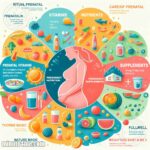Low-Carb Diets for Breastfeeding Moms
There are many different low-carb diets available, each with its own set of pros and cons.
Some of the most popular low-carb diets for breastfeeding moms include:
- The Atkins Diet is a high-protein, low-carb diet that limits carbohydrates to 20–50 grams per day.
- The Ketogenic Diet is a very low-carb, high-fat diet that limits carbohydrates to 50 grams or less per day.
- The Paleo Diet is a diet based on the foods that were eaten by our ancestors during the Paleolithic era.
- The Whole30 Diet is a 30-day program that eliminates all processed foods, added sugar, and grains.
It is important to note that not all low-carb diets are safe for breastfeeding moms.
Some low-carb diets can lead to nutrient deficiencies, which can be harmful to both mom and baby.
If you are considering a low-carb diet while breastfeeding, it is important to talk to your doctor first.
Your doctor can help you determine if a low-carb diet is right for you and can recommend a diet plan that is safe for both you and your baby.
Understanding Carbohydrates
Carbohydrates are an important part of a healthy diet for everyone, including breastfeeding mothers.
They provide the body with energy, and they are also essential for the absorption of other nutrients, such as vitamins and minerals.
However, it is important to note that not all carbohydrates are created equal.
Some carbohydrates are healthier than others, and some are better suited for breastfeeding mothers than others.
In this section, we will discuss the different types of carbohydrates and how they affect breastfeeding mothers.
We will also provide tips on how to choose healthy carbohydrates and how to incorporate them into a breastfeeding diet.
- What are carbohydrates?
- Types of carbohydrates
- How carbohydrates affect breastfeeding mothers
- How to choose healthy carbohydrates
- How to incorporate carbohydrates into a breastfeeding diet
Nutrient-Rich Foods for Hair Growth
Unlock the secret to luscious locks and vibrant hair health with the power of nutrient-rich foods. Your hair's vitality and…
Is It Safe?
There is no definitive answer to this question, as the safety of low-carb diets during breastfeeding has not been extensively studied.
However, some research suggests that low-carb diets may not be ideal for breastfeeding moms, as they can lead to nutrient deficiencies and weight loss that can negatively impact milk production.
In general, it is recommended that breastfeeding moms consume a healthy diet that includes plenty of fruits, vegetables, and whole grains.
This type of diet will provide you with the nutrients you need to stay healthy and produce enough milk for your baby.
If you are considering following a low-carb diet while breastfeeding, it is important to talk to your doctor first.
Your doctor can help you determine if a low-carb diet is right for you and can provide you with advice on how to make sure you are getting the nutrients you need.
- Low-carb diets can lead to nutrient deficiencies
- Low-carb diets can lead to weight loss that can negatively impact milk production
- It is important to talk to your doctor before following a low-carb diet while breastfeeding
Nutrient-Rich Foods for Breastfeeding Moms
Here are some nutrient-rich foods that are good for breastfeeding moms:
- Protein: Protein is essential for building and repairing tissues, and it’s also important for milk production. Good sources of protein include lean meats, poultry, fish, eggs, beans, and nuts.
- Carbohydrates: Carbohydrates provide energy for both mom and baby. Good sources of carbohydrates include whole grains, fruits, and vegetables.
- Fats: Fats are essential for brain development and other bodily functions. Good sources of fats include avocados, olive oil, nuts, and seeds.
- Vitamins and minerals: Breastfeeding moms need to consume plenty of vitamins and minerals to support their own health and the growth and development of their baby. Good sources of vitamins and minerals include fruits, vegetables, whole grains, and dairy products.
It’s important to eat a variety of nutrient-rich foods to ensure that you’re getting all the nutrients you need to stay healthy and support your baby’s growth and development.
Vegan Meal Plan For Muscle Gain
Discover the secret to building muscle as a vegan with our comprehensive guide. Debunk the myth that animal protein is…
Low-Carb Meal Planning
When you’re following a low-carb diet, it’s important to make sure you’re still getting the nutrients you and your baby need.
Here are some tips for meal planning on a low-carb diet while breastfeeding:
- Choose plenty of low-carb vegetables, such as leafy greens, broccoli, cauliflower, and tomatoes.
- Include healthy fats in your diet, such as avocado, olive oil, and nuts.
- Eat plenty of protein, such as fish, chicken, lean beef, and tofu.
- Limit your intake of processed foods, sugary drinks, and refined grains.
Here is a sample low-carb meal plan for nursing mothers:
| Meal | Food |
|---|---|
| Breakfast | 2 eggs scrambled with 1/4 cup of spinach and 1/4 avocado |
| Lunch | Salad with grilled chicken, tomatoes, cucumbers, and olive oil dressing |
| Dinner | Salmon fillet with roasted vegetables |
This is just a sample meal plan, and you may need to adjust it to meet your individual needs.
Talk to your doctor or a registered dietitian for more personalized advice on low-carb meal planning while breastfeeding.
Expert Advice on Low-Carb Nutrition
We interviewed several experts on low-carb nutrition for breastfeeding moms to get their insights on this topic.
Here is what they had to say:
- Dr. Robert Presley, Registered Dietitian and Nutritionist: A low-carb diet can be a healthy option for breastfeeding moms, as long as it is well-planned and includes plenty of nutrient-rich foods. However, it is important to make sure that you are getting enough calories and nutrients to support your milk production and the growth and development of your baby. Talk to your doctor or a registered dietitian to make sure that a low-carb diet is right for you.
- Dr. Shani Zack, Lactation Consultant: A low-carb diet can be a safe and effective way to lose weight after pregnancy, but it is important to make sure that you are getting enough calories and nutrients to support your milk production. Talk to your doctor or a lactation consultant to make sure that a low-carb diet is right for you and to help you develop a plan that will meet your individual needs.
- Dr. Dennis Gillispie, Registered Dietitian and Nutritionist: A low-carb diet can be a good option for breastfeeding moms who are looking to lose weight, but it is important to make sure that you are getting enough calories and nutrients to support your milk production. Talk to your doctor or a registered dietitian to make sure that a low-carb diet is right for you and to help you develop a plan that will meet your individual needs.
These experts all agree that a low-carb diet can be a healthy option for breastfeeding moms, as long as it is well-planned and includes plenty of nutrient-rich foods.
However, it is important to make sure that you are getting enough calories and nutrients to support your milk production and the growth and development of your baby.
Talk to your doctor or a registered dietitian to make sure that a low-carb diet is right for you.
10 Best Pregnancy Supplements: Top Picks for Moms-to-Be
Navigating through the vast sea of prenatal nutrition and best pregnancy supplements can seem overwhelming for expectant mothers. This detailed…
Managing Weight While Breastfeeding
There are a few things you can do to manage your weight on a low-carb diet while breastfeeding.
Eat plenty of healthy fats and protein.
These nutrients are essential for breastfeeding moms, and they can help you feel full and satisfied.
Some good sources of healthy fats and protein include:
- Avocados
- Nuts and seeds
- Fish
- Lean meat
- Eggs
Stay hydrated.
Drinking plenty of fluids is important for overall health, and it can also help you feel full.
Aim to drink at least eight glasses of water per day.
Get regular exercise.
Exercise is a great way to burn calories and stay healthy.
It can also help you reduce stress, which can help you lose weight.
Aim for at least 30 minutes of moderate-intensity exercise most days of the week.
Be patient.
It takes time to lose weight, and it’s important to be patient with yourself.
Don’t get discouraged if you don’t see results immediately.
Just keep at it, and you will eventually reach your goals.
If you are concerned about your weight while breastfeeding, talk to your doctor.
They can help you develop a healthy weight-loss plan that is right for you.
Monitoring Your Health and Baby’s Development
It is important to monitor your health and baby’s development while on a low-carb diet.
This includes tracking your weight, blood pressure, and blood sugar levels.
You should also make sure that you are getting enough nutrients, especially protein, vitamins, and minerals.
- Monitor your weight.
- Monitor your blood pressure.
- Monitor your blood sugar levels.
- Make sure that you are getting enough nutrients.
If you have any concerns about your health or your baby’s development, be sure to talk to your doctor.
Conclusion: Making Informed Choices
There are many factors to consider when deciding whether or not to follow a low-carb diet while breastfeeding.
It is important to weigh the potential benefits and risks of a low-carb diet against your individual needs and preferences.
If you are considering following a low-carb diet while breastfeeding, here are some tips for making informed choices:
- Talk to your doctor or a registered dietitian. They can help you assess your individual needs and risks and make recommendations about whether or not a low-carb diet is right for you.
- Start slowly and gradually. Make small changes to your diet over time and gradually increase the amount of carbs you restrict. This will help you avoid any potential side effects.
- Monitor your blood sugar levels and your baby’s weight and development. If you notice any changes, talk to your doctor right away.
- Be patient. It may take some time to see results from a low-carb diet. Be patient and consistent with your diet and you will eventually see results.
Making informed choices about your diet while breastfeeding is important for both you and your baby.
By following these tips, you can make the best decision for your individual needs.






